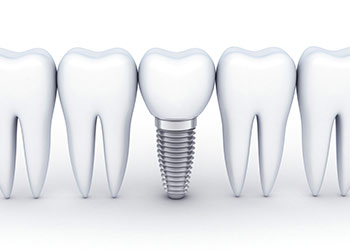The decision to have teeth replaced with dental implants isn’t one that can be taken lightly. After all, it does involve a sensitive area of your body which is essential for you to function on a daily basis. So it’s hardly surprising that the question we get asked often by our patients is “What problems with dental implants can occur?”
This question is very relevant for obvious reasons. After all, nobody wants a failing implant because spotting dental implant problems early can make all the difference. The problem is that generally speaking a person won’t feel any pain linked to a failing implant. However, on rare occasions, Severe pain after dental implant placement can be agonising if it’s not treated in a timely fashion.
If you suspect your dental implants might be failing, then we always advise that you book a consultation at your local dental clinic immediately. But in addition, let’s take a look at common reasons for implant failure and any signs of dental implant rejection you need to look out for.
Common problems with dental implants
Most patients want to know as much as they can about problems with dental implants so they can avoid doing anything which might increase the risk of implant failure. In reality, while some of the underlying factors that may cause dental implants failure are within your control, others aren’t.
Some implant rejections for example are caused by allergies or genetics and others are due to poor oral care, or a combination of both. That said, there are 4 major reasons why dental implants fail:
- Early implant failure – some bodies are more sensitive to foreign objects than others and some patients may have undiagnosed allergies, such as a metal allergy, which would need consideration before deciding which type of dental implants to use.
- Late implant rejection – this often occurs after the bone has healed and is usually due to failure to follow dental implant post-op instructions or poor hygiene. Other reasons for implant failure are trauma due to the teeth not being correctly aligned and of course, smoking.
- Older implant limited technology – Many dentists find themselves replacing older implants which have eventually failed because technology and materials available at the time haven’t held up, or they’re simply worn out.
- Poor oral hygiene – even though dental implants can’t decay because they’re not natural teeth, it’s vital to be diligent with your oral hygiene to avoid any infections or gum disease which could lead to gum recession, bone erosion, and implants loosening or falling out.
4 Early Warning Signs Of Implant Failure To Be Aware Of
If you’re experiencing any of the 4 symptoms below, you should visit your dentist urgently for dental implants corrective treatment.
# 1 Throbbing pain after dental implant surgery
While it’s natural to experience some pain during the healing process, pain can also be a sign that something has gone wrong. Pain just after the implant has been inserted is normal and shows that your body is healing but it should ease after a few days. Dental implant pain after 2 weeks could be an early indication that your implant is failing so it’s important to visit your dentist as soon as you can. It may be there is nothing wrong but it’s always ‘better to be safe than sorry‘, as the proverbial saying goes.
#2 Gum inflammation
Minor swelling is normal having undergone dental implant surgery but if it continues and your gums become inflamed, then there is cause for concern. Dental implant infection signs include gums that are redder than normal and without treatment the infection could spread to
other areas of your mouth. In severe cases, infection can enter the bloodstream which is a very serious condition. Gum infections are easier to treat caught early and often involve little more than a course of antibiotics and antiseptic mouthwash to prevent further infection.
#3 Dental implants don’t feel secure
A correctly placed implant should feel just like a natural tooth. In fact, you should be able to forget that it’s even there. Dental implants should NEVER feel alien in your mouth and should NEVER be wobbly. This is one of the easiest warning signs of dental implant rejection to spot. A loose implant can damage your mouth and in some cases, it may need to be removed to prevent it from doing any further damage.
#4 Difficulty biting or chewing
If you’re having problems biting down or chewing your food this could be another sign that your implant is failing. Dental implants should feel and function just like your normal teeth and if you’re experiencing pain with an implant it’s never a good sign. Don’t ignore the problem as it will only get worse.
How to lower the risk of dental implant failure
Most cases of dental implant failure are due to inflammation and infection as opposed to more complex issues. The best possible way to reduce your risk of implant failure is to maintain good oral hygiene at all times. The second most important factor is to choose a well trained and experienced dentist that offers consultation prior to any surgery.
At Dental 266 we’ve been placing dental implants since 2008 and are one of Sydney’s leading providers. If you’re interested in getting dental implants then book a consultation near you! Get in touch with our team of experts by calling 02 9051 0600







